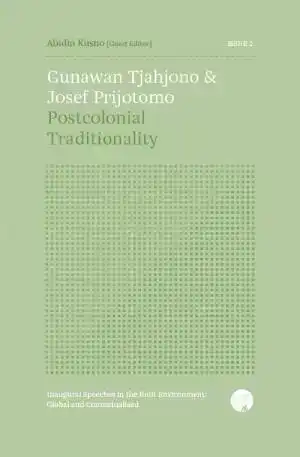- Engels
- Study
- nature & science
- technische wetensch.
- bouwkunde
- POSTCOLONIAL TRADITIONALITY
TJAHJONO, GUNAWAN
POSTCOLONIAL TRADITIONALITY
19,95incl BTW
Vertrouwd sinds 1927
Persoonlijke aandacht en advies
Vanaf 17,50 gratis verzenden NL & BE
Meer dan 150.000 artikelen online
Omschrijving POSTCOLONIAL TRADITIONALITY
In 2002, Gunawan Tjahjono opened his inaugural speech at University of Indonesia with a reference to Vincent Van Romondt, the last remaining Dutch tutor of architecture in Indonesia, who had pioneered an approach that challenged Indonesians to think
about the relationship between architecture and ''nationbuilding''. Since independence, the topic of ''towards an Indonesian architecture,'' has received various interpretations, with numerous references to Van Romondt. Josef Prijotomo, one of the mo
st respected Indonesian architectural theorists, for instance, wrote an article in a newspaper in 1982 entitled: ''Van Romondt dan peran arsitekt Indonesia [Van Romondt and the role of Indonesian architects]''. Prijotomo reminded Indonesian architect
s of Van Romondt''s inaugural speech and his emphasis on the importance of architecture in the nation-building of postcolonial Indonesian society. He also revisited Van Romondt''s question of whether social and cultural values of Indonesia could be t
he foundation for the construction of architects'' identities in this time of transition.
Indonesia is a postcolonial country, and its architects engage with the spirit of decolonization by coming to terms with (instead of ignoring) their co
lonial past. This reflection on inaugural lectures delivered by Indonesian professors in the postcolonial era reveals a simultaneous identification with and problematization of a Dutch/European legacy of architecture.
This booklet seeks to
explore the theme of architecture and postcolonialism by focusing on the inaugural lectures of Gunawan Tjahjono and Josef Prijotomo as symptomatic responses to a postcolonial condition, in an effort to construct or re-work an ''Indonesian architectur
e'' - a theme that was central to Van Romondt''s inaugural lecture. It addresses this theme by considering the political context against which their lectures emerged. We start with a brief and discursive discussion of institutional shifts in architec
ture at the time of transition, from a more technical sphere to ''architecture'' and how such a shift has shaped architectural thinking beyond the technical, to capture the social. The discussions provide context for understanding the theme of post c
olonialism in the inaugural lectures of Gunawan Tjahjono and Josef Prijotomo.
about the relationship between architecture and ''nationbuilding''. Since independence, the topic of ''towards an Indonesian architecture,'' has received various interpretations, with numerous references to Van Romondt. Josef Prijotomo, one of the mo
st respected Indonesian architectural theorists, for instance, wrote an article in a newspaper in 1982 entitled: ''Van Romondt dan peran arsitekt Indonesia [Van Romondt and the role of Indonesian architects]''. Prijotomo reminded Indonesian architect
s of Van Romondt''s inaugural speech and his emphasis on the importance of architecture in the nation-building of postcolonial Indonesian society. He also revisited Van Romondt''s question of whether social and cultural values of Indonesia could be t
he foundation for the construction of architects'' identities in this time of transition.
Indonesia is a postcolonial country, and its architects engage with the spirit of decolonization by coming to terms with (instead of ignoring) their co
lonial past. This reflection on inaugural lectures delivered by Indonesian professors in the postcolonial era reveals a simultaneous identification with and problematization of a Dutch/European legacy of architecture.
This booklet seeks to
explore the theme of architecture and postcolonialism by focusing on the inaugural lectures of Gunawan Tjahjono and Josef Prijotomo as symptomatic responses to a postcolonial condition, in an effort to construct or re-work an ''Indonesian architectur
e'' - a theme that was central to Van Romondt''s inaugural lecture. It addresses this theme by considering the political context against which their lectures emerged. We start with a brief and discursive discussion of institutional shifts in architec
ture at the time of transition, from a more technical sphere to ''architecture'' and how such a shift has shaped architectural thinking beyond the technical, to capture the social. The discussions provide context for understanding the theme of post c
olonialism in the inaugural lectures of Gunawan Tjahjono and Josef Prijotomo.
Leesfragment
Specificaties
- MerkBK Books
- GroepTECHNISCHE WETENSCH (950)
- Barcode9789492516657
- LeverstatusActief
Reviews
0.0/5.0
Gemiddelde uit 0 reviews
Meest behulpzame reviews
Nog geen reviews geschreven


